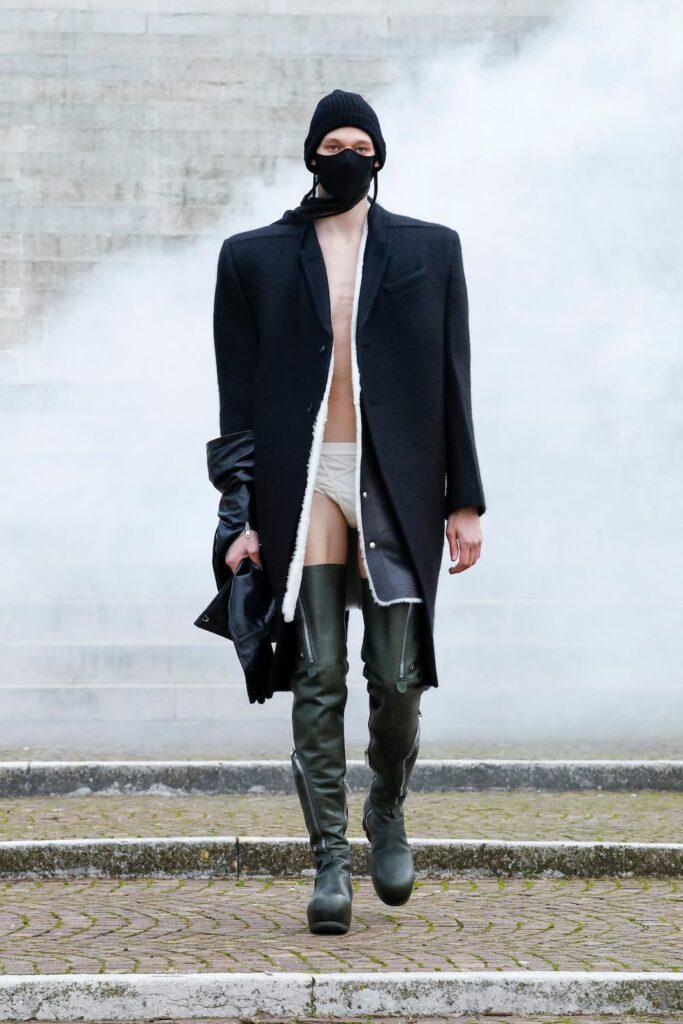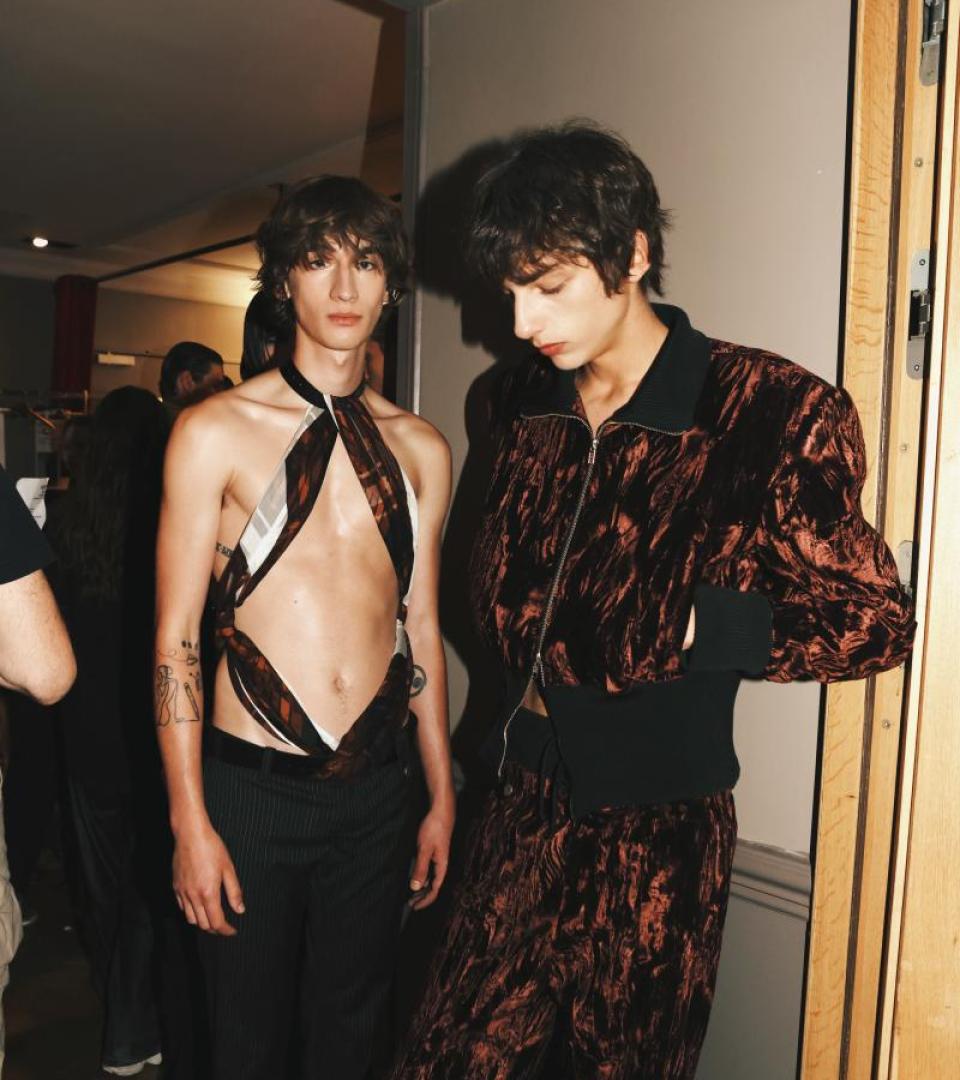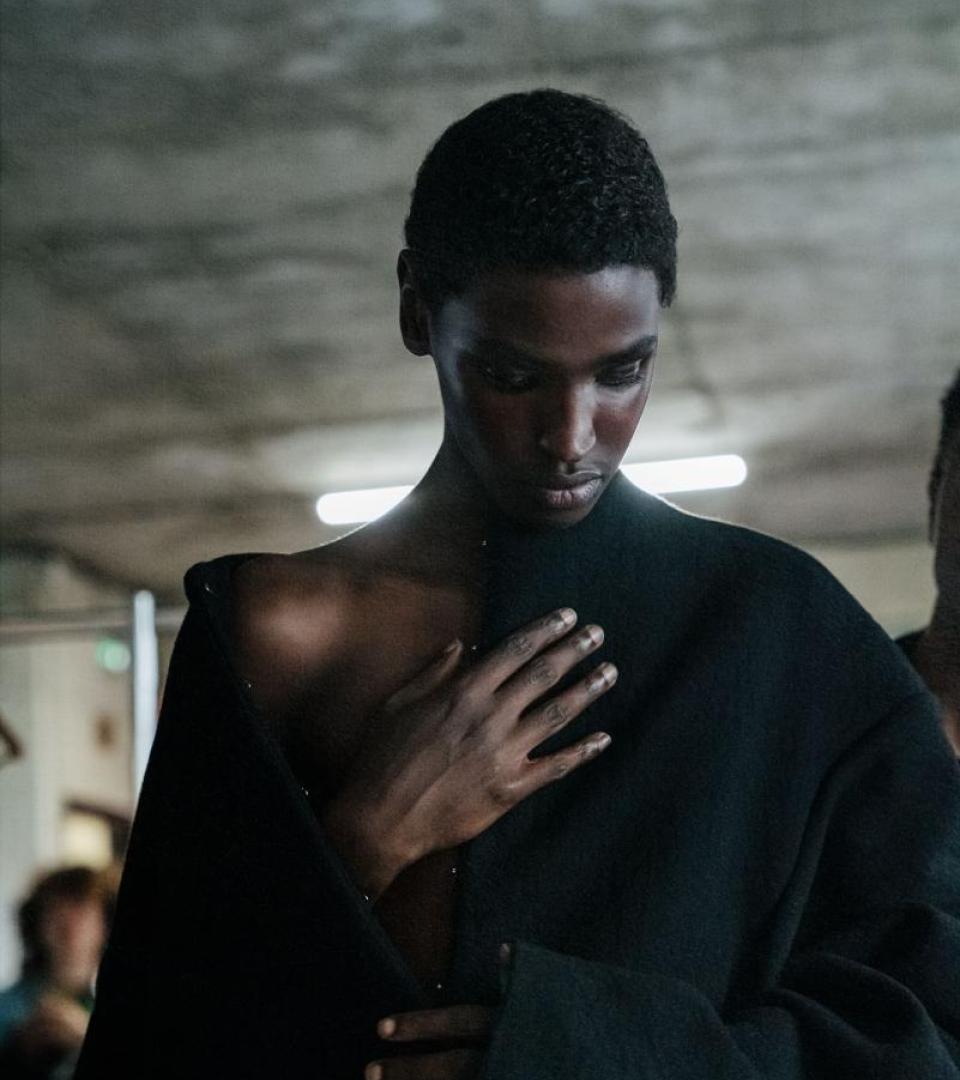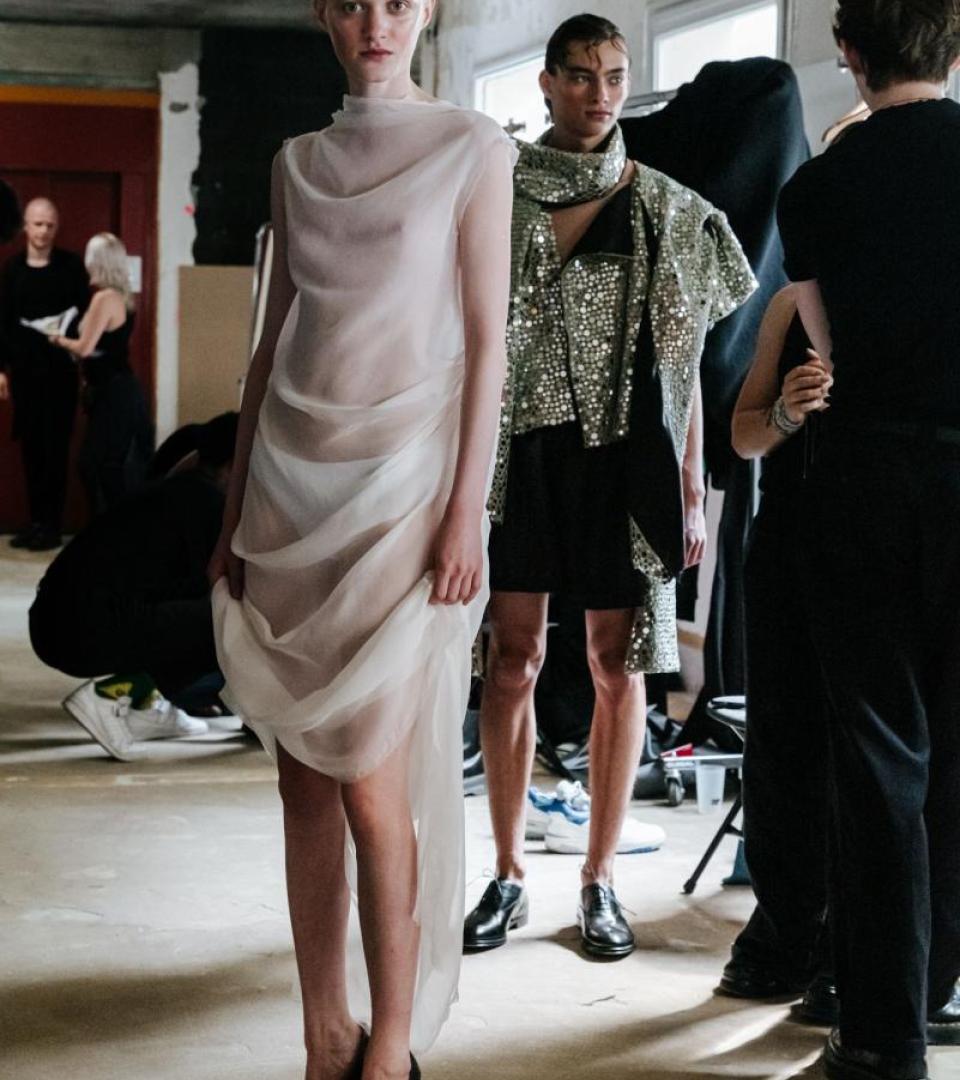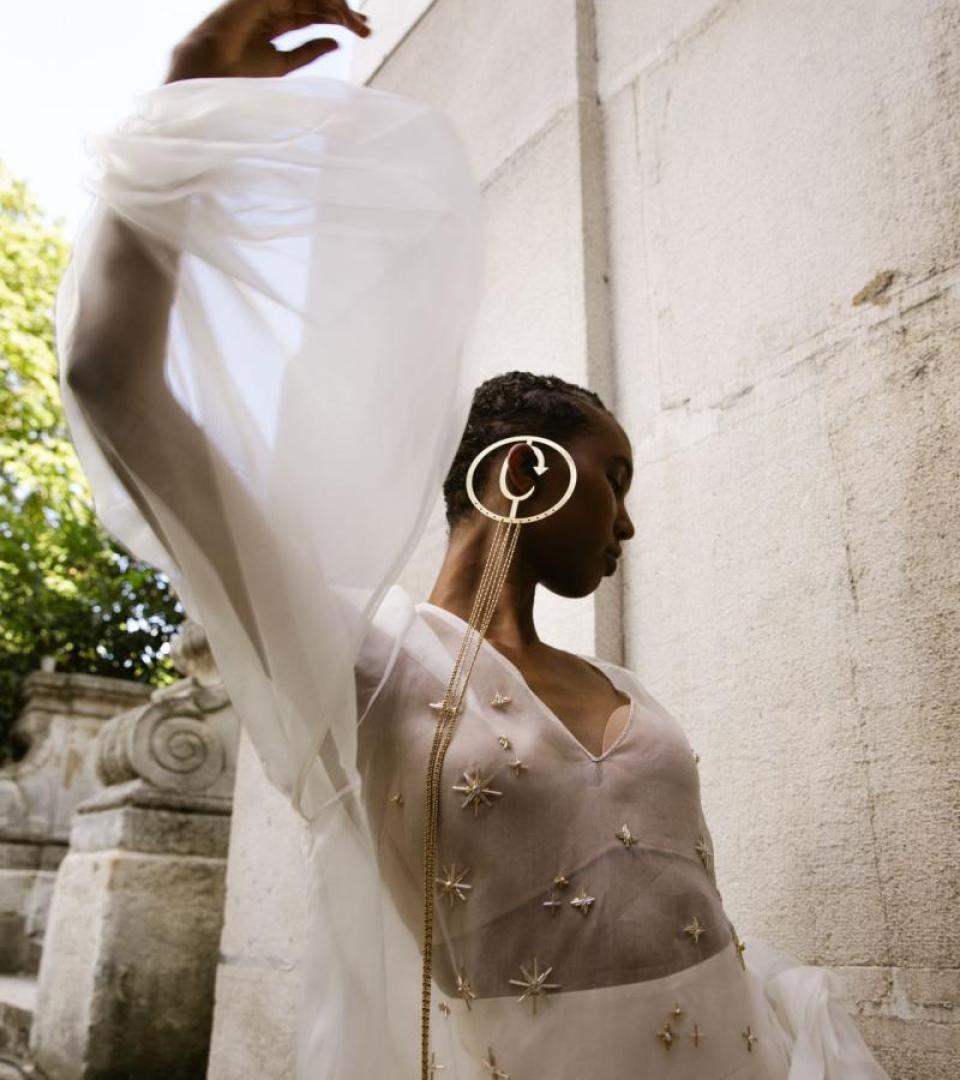Rick Owens and Fall/Winter 2021: Pentagram Briefs, Political Horror and Poignant Realism

Rick Owens, as fans know, isn’t afraid of getting into a little trouble. Over the years, the media has called him a bad boy, an enfant terrible of Pop-goth fashion individualism, but his mischievousness isn’t fueled by naivete. It is, rather, framed by intellect; the man knows how to provoke for gain, and it’s a profound skill, one that has certainly helped to keep him in independent business since founding his eponymous label in 1994.
His most recent dust-up occurred with the filming of his Fall/Winter 2021 collection, which can be viewed here. Owens, his team and his models were recording an audience-less runway show in front of the Tempio Votivo on Venice’s Lido. (The designer has an apartment nearby, and has spent much of the Covid-19 pandemic in Italy.) The Tempio Votivo is an ossuary that holds the remains of Italian soldiers lost during World Wars I and II. In 2021, with the world ablaze in a different manner, Owens had a number of bare-chested models in “Pentagram briefs” walking in front of the memorial; the underwear, much-discussed and memed online, features an inverted five-point star construction and set of seams (including an opening, much like any other brief pour les hommes).
“I have to mention, the city got mad at me for this,” says Owens over Zoom. “And I get it, there’s a conservative side here that might not appreciate boys in underwear in front of this place.” He doesn’t smile as he says this; rather, there’s a playful sort of saucer of light circling in his eyes. It’s all by design, but none of it is with misintent.
One of Owens defining traits is that he is able to generate clothing that is, at first glance, aggressive or menacing or controversial, but that eventually is pierced by light the more the observer comes to understand his thought process. He’s somehow an industry arbiter of sociopolitical commentary and human critique without ever giving into the expectations and motions of the field. He exclusively looks inward. For Owens, trends are tedious, groupthink is garish, and satisfying anyone other than oneself is silly. Highlighting the human condition is his dazzling skill and likely his propellant, too. This makes him miraculously rare—and vital—in the fashion design ecosystem. Below, we check in with Owens on everything from new rituals to politics to the frank realities of what simmers beyond the horizon.
Rick, hi. You’re in Venice right now, no?
I actually just got to Concordia, which is two hours away from Venice. It’s where my factory is. So, I divide my time between here and Venice and sometimes Paris.
Do you keep a place in Concordia?
I do. I have a really great apartment with a big terrace, right across the street from the factory. But, this village is industrial and not picturesque at all. It is convenient, though. And being here is usually my most productive time. I kind of count on having a few days alone every week in the factory to really focus, because with the rest of the time, with meetings and questions and so on, I can’t get into a zone.
That’s very understandable! Speaking of being in a zone, what is your post-show mood? In your press release, there’s discussion of Fall/Winter 2021 examining “male suppressed rage on every side of the moral divide.” The U.S. had its presidential inauguration on the day of your show, but there isn’t necessarily this release that may have been anticipated…
Because it’s not a real release! There is the underlying thread that [the election] was such a close call. And that’s horrifying. The fact that it was a close call and the fact that it was even a question is horrifying. On the morning of the show, I was looking at the headlines that were so optimistic and happy, and I was thinking, oh, well, today my show is all about doom and dread and anger and it’s really going to hit the wrong note, because everybody wants to be in a jubilant mood. But I don’t think this invalidated the urgency behind this show, because the threat is still out there. It was a close call and it’s still there. So I went ahead and did the aggressive, violent show, anyway.


With everything that has been going on, from global health crisis to political hot topics in both Europe and the United States, did you find that your creativity was impacted in one way or another? Was there a new sensation?
It has been challenging. I’ve always loved the phrase ‘how you deal with adversity is what defines your character.” And I think that when things are difficult, you have to step it up and you have to give vitality and energy and power. That’s what made me decide to do the shows at the Lido. And they have been so fulfilling, because they have been great moments to regroup and to reduce and to edit. We didn’t fly in teams of hair and makeup, which was a wonderful feeling. We just used our core group, some of whom we’ve worked with for nearly 20 years. It was all hands on deck. I was doing hair. And it has become this kind of private ritual for us, all of us. We’re pitching a tent, we’re setting up fog machines, we’re turning up the music really loud. The guys and girls parade out, and then it’s over, and we pack it up and go home with no audience for any of it. There is something about this that is very pleasurable. We really bonded.
Would you call that closeness and intimacy with your team a silver lining? Do you want to keep that, if things do swing back to a more public-facing and heavily-staffed fashion show format?
Well, the silver lining to Covid-19 in general has been gratitude. It has made so many people more grateful for what they have, and it makes us appreciate our loved ones so much more. It has made us give our loved ones more time than we’ve ever given before, and that’s an amazing silver lining. So, this worked for me personally and professionally.
Do you think we will fall back on our ways?
Yeah, sure. There have been global crises before. People might have a little bit of a memory, some gratitude and some reverence for the time, but, you know, greed and voracious appetites will surface once again. It’ll turn into an orgy again, which is fine. That’s the way it works. And I do not mean to sound disapproving, because I put just as much energy into the things that I want to consume. That’s part of life. What I want to consume is the pursuit of being able to control what I do, and have the power to create anything that I want. I want that more than ever. I’m not trying to buy a Lamborghini, but [this freedom] is still expensive.
You’re gearing up for womenswear now, which you will also show in Venice. Will that collection be similar to menswear, thematically?
I rarely talk about aggression or violence when I’m doing a women’s show, because all of my shows are kind of autobiographical and an examination of my own psyche. And, I have moments of aggression that still surprise me and horrify me. But on the other hand, I think I sometimes need that aggression to propel me forward. With women, it’s not autobiographical, so it’s more about my admiration. The funny thing is, though, Michele [Lamy] had told me in the past that sometimes my women get a little too stately, and that they’re not fuckable enough. So, I try to listen to her.
